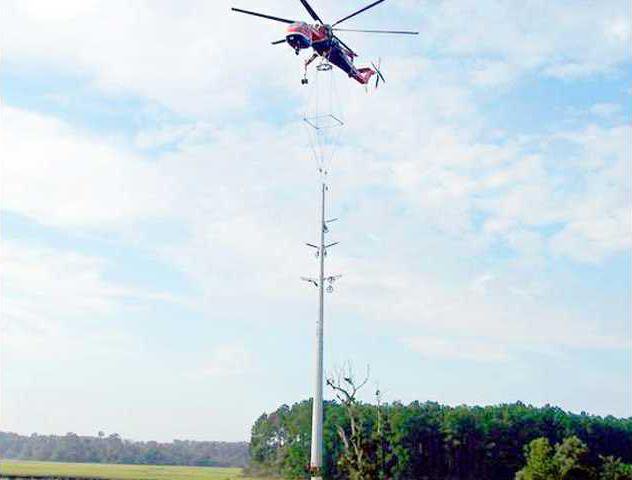East-end Liberty County resident Otis Amason is concerned about the new high-voltage power lines being installed along Interstate 95 from the Tradeport East Industrial Park substation to the Burnt Church substation in Bryan County.
Amason, a Korean War veteran, reported that his pacemaker has, in the past, been “knocked out” by the high-voltage towers in Richmond Hill near the intersection of Highway 17 and Ford Avenue. He said his pacemaker also can be turned off by the metal detectors at the Liberty County Justice Center and the courthouse annex.
“I didn’t get to be 84 years old by being a fool,” Amason said. “I try to avoid things that are bad for me. When I got within 50 yards of those (power-line towers) by the CVS and that other pharmacy (Walgreens) in Richmond Hill — bang. (My) pacemaker was off!”
Amason, who has had a pacemaker for 14 years, is concerned that the proximity of the new power lines to Highway 84 and I-95 may be enough to affect his pacemaker.
Jeannine Haynes, public-affairs director for the Georgia Transmission Corporation, which soon will complete the power-line construction project, said the risk of negative effects from the magnetic fields created by high-voltage power lines is small.
“The magnetic fields produced by power lines, appliances and anything electric drop off rapidly with distance,” Haynes said. “For this reason, you typically get more magnetic-field exposure from the wiring or appliances in your home, business or school than a power line.”
She said the new lines, which will run through the salt marshes up to 75 yards from the highway, are being installed because Coastal Electric Cooperative identified the need for a second high-voltage electric-transmission line. She said pacemakers rarely are affected by power lines and suggested Amason talk with his cardiologist.
According to the National Center for Biotechnology Information, http://www.ncbi.nlm.nih.gov/pubmed/15766826, in 2005 the French conducted a study in which 245 pacemaker patients were exposed to a high-level magnetic field and monitored for possible effects. Three of the 245 patients experienced problems with their pacemakers. The pacemakers of these patients were noted as being set in the “unipolar sensing configuration,” the study said.
Haynes said the French study is old and pointed out that it exposed patients to magnetic-field levels much higher than anyone would normally encounter. She reiterated that residents concerned that their pacemakers might be compromised by new or existing power lines need to consult their doctors or pacemaker manufacturers.
“We will be happy to take magnetic-field readings for Mr. Amason once the new line is energized,” Haynes said. “He should also share (his concerns) with his physician and the maker of the pacemaker. We would also be willing to meet with him and take readings around his home.”
Haynes called magnetic fields from electrical appliances and power lines ubiquitous, noting that most everyone is surrounded by these lines and uses electrical appliances in their everyday lives.
“Mr. Amason is exposed to electric and magnetic fields that are much higher than those produced by the transmission line every day in his home,” she said. “The distribution line that brings power to every home and business can produce fields that are higher than the transmission line. The key factor is distance. Even though the transmission line might produce higher fields, it is much farther away.”
Haynes said transmission lines, wiring and appliances use 60 hertz power, which she explained is at the lower end of the electromagnetic spectrum. She said it’s different and much lower than the fields used in metal detectors, microwaves, cellphones and medical equipment. She said transmission lines typically operate at considerably lower power levels than cellphone towers.
She said GTC previously encountered concerns about the perceived risks of magnetic fields, usually from landowners whose property is crossed by a line. She said any Georgia resident concerned about power lines installed by GTC is welcome to call her office at 770-270-7741. A GTC representative will talk or meet with the concerned individuals and take readings around their homes or the power lines in question, she said.
East-end resident fears line will interrupt pacemaker


Sign up for our e-newsletters